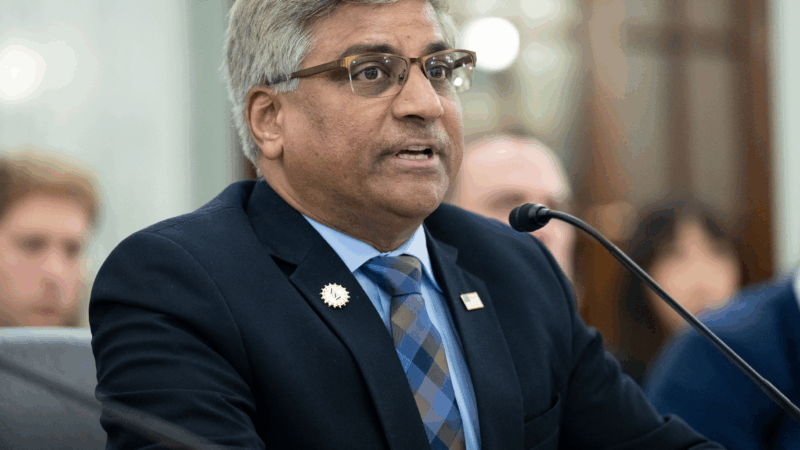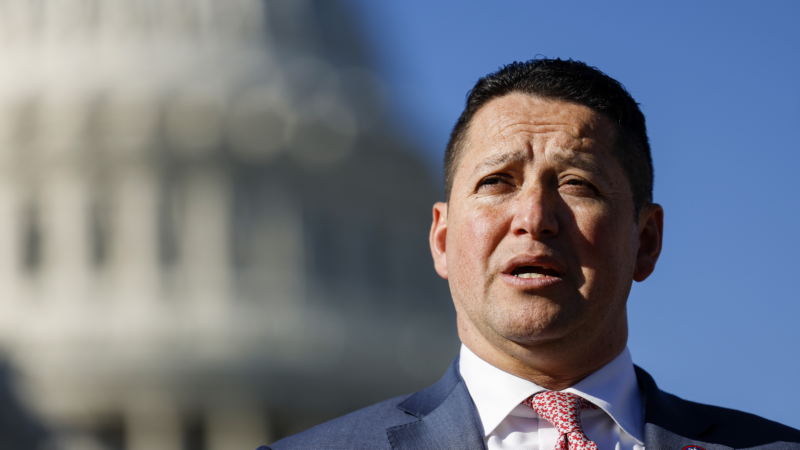Scientists reel as turmoil roils National Science Foundation
The Trump administration is sharpening its attacks on the National Science Foundation, the government agency that is a major funder of basic science, math and engineering, especially at colleges and universities across the United States.
The latest salvo: a preliminary budget request from the White House that would cut $4.7 billion, or more than half the agency’s $9 billion budget.
The proposal landed the same day the NSF said 344 previously approved grants had been terminated as they “were not aligned with agency priorities,” according to an email to NPR. This follows two previous waves of cancellations, in April, that terminated over a thousand awards.
What’s more, the agency now has stopped issuing any new awards and has stopped funding all existing ones, the science journal Nature says. A spokesperson for the NSF, asked about that reporting, declined to comment.
Amid all this turmoil, the NSF’s director, Sethuraman Panchanathan, abruptly left last week, saying, “I believe I have done all I can.”
Eliminating so much of this agency’s budget would be “a crisis, just a catastrophe for U.S. science,” says Sudip Parikh, chief executive officer of the American Association for the Advancement of Science, one of the largest scientific societies in the world.
He’s optimistic that Congress wouldn’t go along with it, but the budgetary process would likely take months.
Meanwhile, the uncertainty would leave scientists fretting over how to support their labs and the students and early-career researchers who work there.
“That’s created this paralysis that I think is hurting us already,” says Parikh, who says that when he talks to scientists, he’s starting to hear them express an interest in having an “exit plan from these jobs.”
Marianna Zhang, a cognitive scientist at New York University who studies how children form stereotypes and how to reduce those stereotypes, says she learned that her two-year fellowship was being canceled in an email from the NSF that she said misspelled the word “priorities.” Her work no longer served those priorities, it said.
“I was just numb,” she says, explaining that she’d gotten the email while driving to a science conference and had pulled over to read it. “It was just shocking. I cried, out there on the side of the road.”
“Wider and weirder”
Some of the grants canceled initially involved diversity, equity and inclusion or looked at misinformation or disinformation. These two categories of research have previously been targeted by Republicans in Congress such as Rep. Jim Jordan and Sen. Ted Cruz.
But the cancellations did not stop there.
“As it goes on, you see that the reach of it just gets wider and weirder,” says Noam Ross, executive director of a nonprofit called rOpenSci, who started a database so that people could self-report the cancellations of their grants.
“Just looking at this, there’s a conference on geometry and topology that was canceled,” says Ross. “Why was it canceled, right?”
He notes that the grant for holding this conference may have mentioned scholarships for students from underrepresented communities. In the past, many NSF-funded researchers were encouraged to explain how their work would boost engagement in the sciences.
Many of the canceled grants focus on education — especially at small, midsize, rural or minority-serving colleges and universities.
Take the previously NSF-funded Rustbelt RNA Meeting, for example. “We really emphasize students,” says Charles Hoogstraten of Michigan State University, who notes that the NSF had funded it for many years. “The vast majority of our talks and a good majority of our posters are given by students.”
For many poorer students who can’t afford to travel, this is one of their few chances to attend a high-level scientific conference, says Hoogstraten. He and his colleagues are trying to figure out what to do now that funding has been cut.
Amy Hagen, a Ph.D. student at Virginia Tech, sought out NSF funding for geology work she wanted to do that involved dating some rocks from the Cambrian period.
“I applied, was awarded the grant on Thursday and then had it canceled on Friday,” she says.
Growing uncertainty
Kathleen Johnson, a geochemist with the UCI CLIMATE Justice Initiative, says their NSF grant was about $1.5 million a year and worked to make geosciences more diverse and inclusive. Now they face the possibility of staffers being laid off and are scrambling to figure out how to support students this summer.
“There’s a lot of uncertainty,” she says. “It’s been really stressful.”
Asked about the effect of all these cancellations on U.S. scientists, a spokesperson for the NSF said that “NSF declines comment.”
The White House’s budget request for 2026 says that it “cuts funding for: climate; clean energy; woke social, behavioral, and economic sciences; and programs in low priority areas of science.”
“Funding for Artificial Intelligence and quantum information sciences research is maintained at current levels,” it says.
But the abrupt termination of grants with little explanation means that all scientists are feeling the impact, says Parikh.
“Even folks who aren’t being canceled or aren’t being terminated are worried they’re going to be terminated,” he says.
Zhang, at New York University, says she’s starting to wonder whether her future scientific career is going to have to move outside the United States.
“It’s quite scary, what’s happening,” she says. “I think it’s also shaken my faith in the short term that all of this is going on — but also in the long term.”
GOP Rep. Tony Gonzales faces pressure from party over affair allegations
The Texas Republican is facing calls from fellow House Republicans to resign, following allegations of an affair with a staffer who later died by suicide.
In pictures: Winter storm slams the east coast
Photos of cities in Connecticut, New York, New Jersey and Massachusetts as they cope with a powerful winter storm.
The FDA creates a quicker path for gene therapies
The Food and Drug Administration aims to evaluate treatments for rare diseases based on plausible evidence that they would work — without requiring a clinical trial first.
BAFTAs apologize after guest with Tourette syndrome uses racial slur during ceremony
A man with Tourette syndrome shouted a racial slur and other offensive remarks during the BAFTA awards ceremony Sunday. The BBC did not edit out his outbursts in its delayed broadcast.
‘Everything was in pieces:’ Lindsey Vonn describes grueling surgery on broken leg
In a recent video, the Olympic skier credits her surgeon with saving her leg from potential amputation.
A new lawsuit alleges DHS illegally tracked and intimidated observers
Observers watching federal immigration enforcement in Maine who were told by agents they were "domestic terrorists" and would be added to a "database" or "watchlist" are now part of a new federal class action lawsuit.








